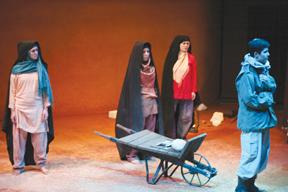Theater play helps orphans

“The Afghan Women” stars Nora Aboali who is on the far right.:
December 10, 2007
Sacramento State’s theatre department is set to debut “The Afghan Women,” a story of struggle and determination between one woman’s quest to save orphaned children and a warlord’s ideology during post-Taliban Afghanistan.
The play, written by William Mastrosimone in honor of the women of Afghanistan, will be performed Thursday through Dec. 16 at Sac State’s Playwright’s Theatre in Shasta Hall.
“The Afghan Women” is written around the main character, Malalai who was born in Afghanistan to an Afghan father and American mother and raised in America. Malalai returns to her native country following the end of Soviet occupation, according to Nora Aboali, a Sac State junior theater arts major who plays Malalai in the production.
When Malalai returns to see her family’s estate, she feels compelled to take action after seeing a child killed by a land mine.
“It’s about four Afghan women who take on a warlord who is trying to keep Afghanistan in a constant state of war,” said Karen Nylund, director and theater arts graduate student.
Malalai’s efforts to make things better are complicated when the warlord and his supporters occupy the orphanage, making prisoners of the children and the four women living at the orphanage, Aboali said.
Sophomore theatre arts major Michael R. J. Campbell plays the warlord who is loosely based on a real-life person.
“He’s a kind of terrible man, almost like a monster,” Campbell said. “I want to go out there on stage and say ‘This is a mad man and the part I play makes him right even though I don’t personally agree with his actions.'”
Nylund is directing the play in connection with her master thesis, “Orientalism in Western Theatres: How Contemporary Playwrights are Deconstructing Historical Notions of the Middle East and Islam in Western Theatres.”
Her interest in the subject began after reading “Orientalism” by the late Columbia University professor Edward Said. “Orientalism” explores the ways western writers have portrayed the Far and Middle East in literature and historical documents, adding that stereotypes which started centuries ago still persist today.
Nylund said the theater department made a brave and important choice by putting “The Afghan Women” on stage.
“I think (the play) is timely because Afghanistan is still a country that the U.S. currently occupies,” Nylund said. “It will be interesting to see the public’s reaction.”
Nylund said the main message she wants the play to convey is “soldiers are never the only ones who pay the price for war.”
Those who attend the play will aid in benefiting orphans in Afghanistan.
Mastrosimone agreed to provide rights to the play for free in exchange for the proceeds to be donated to International Orphan Care, which primarily works to provide an education to orphans in Afghanistan, Nylund said.
She said the proceeds from the play will go to a school and orphanage that cares for about 1,000 children in need.
“Just to get an idea about how much this will help, $2,000 will help feed, clothe and educate the 1,000 Afghan orphans for three months,” Nylund said.
Overall, Aboali said what she’s really motivated by is putting feminism on a stage.
“I love how we have the luxury to do that in the U.S., particularly because our department always does an amazing job at putting diversity on stage,” she said.
Lana Saipaia can be reached at [email protected]
























































































































